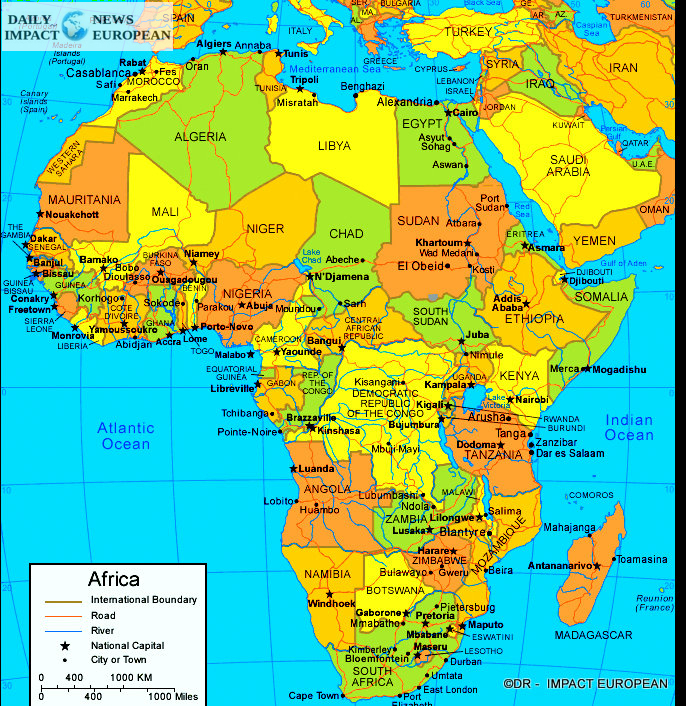2019 was a landmark year for the African continent, large countries organized presidential elections including Algeria, the DRC, Guinea Bissau, Nigeria and Senegal but also Tunisia and Libya. (Interim president pending future presidential elections)
It will be the same in 2020 in Togo where the elections will be held on February 22 and March 7 and Côte d’Ivoire in October.
The year 2019 began with the designation on January 10 of the opponent, leader of the UDPS, Félix Tshisekedi who succeeds Joseph Kabila as president of the Democratic Republic of Congo with 38.57% of the votes. The election follows a decision by the Congolese electoral commission. A result disputed by the other head of the opposition Martin Fayulu who considers this appointment as an « electoral putsh » but also questioned by France.
The second country to elect its president is Nigeria, which renewed the outgoing president, Muhammadu Buhari, on February 27 with 56% of the vote. The most populous country in Africa has a first-past-the-post electoral system with two rounds. Note, however, a fairly low participation of 40%.
Then it was Senegal that re-elected its president, Macky Sall, on March 1. The latter won the election in the first round with 58.27% of the vote and a turnout of 66.24%. He is ahead of Idrissa Seck (20.50%) and Ousmane Sonko (15.67%) who become his main opponents.
Libya has an interim president, Mohamed Youssef el-Megaryef, since May 2019 pending the next presidential elections, the date of which has been postponed several times; they will follow the drafting of a new constitution.
Following the death in July of its president, Beji Caid Essebsi, Tunisia elected on October 15 its new president, the societal conservative candidate, the lawyer Kaïs Saïed. A victory obtained in the second round with 77% of the vote and almost 58% of participation. He was thus ahead of businessman Nabil Karoui, freshly released from detention after spending most of the electoral campaign incarcerated while awaiting the verdict of his corruption trial. In total, there were 26 candidates but it was the youth in search of change and the values of the revolution that determined this overwhelming end result.
Another large Maghreb country, Algeria went to the polls to elect its new president. On December 12, Abdelmadjid Tebboune succeeded Abdelaziz Bouteflika, of whom he was Prime Minister. The sick former president was forced to resign in April following an unprecedented popular protest movement, the Hirak, that the country had suffered for 10 months. Note however a high abstention rate of almost 60% following the boycott linked to the Hirak and the low participation in Kabylia. President Tebboune was elected with 58.13% of the votes in the first round against 4 other candidates (Abdelkader Bengrina, Ali Benflis, Azzedine Mihoubi, Abdelaziz Belaïd). Since 1970, he has been prefect, several times minister then Prime Minister of Bouteflika; he was also the candidate of the army according to the people. On the other hand, within 2 months, a reform of the constitution and a referendum to validate the text should be proposed, a commission of 17 people, including a majority of law professors have just been appointed January 8.
However, the crisis continues, as do the demonstrations which reach the 47th Friday in protest despite the death of the chief of staff and strongman of the country Ahmed Gaïd Salah, on December 23, and the provisional release of several dozen demonstrators.
Guinea Bissau is the last country to elect its president in 2019. In a tense climate and scuffles, Umaro Sissoco Embaló was elected with 53.55% and 72.67% of participation. This result was contested by his opponent, Domingos Simões Pereira, who led the first round with 40.1% of the vote against 28% for Embalo. The Supreme Court has days to examine and rule on the appeal.
The year 2020 will see the organization of presidential elections in Togo and Côte d’Ivoire.
In Togo, presidential elections will be held on February 22 and March 7, 2020, the electoral campaign will begin on February 6. Facing the outgoing president, Faure Gnassingbé in power since 2005, positions himself the former Togolese Prime Minister Agbéyomé Messan Kodjo, invested sole candat of the opposition by the committee of wise men of the Togolese opposition carried by the archbishop of Lomé, Mgr Philippe Fanoko Kpodzro and certain declared candidates including Aimé Gogue, Pierre Ekue Gamesu Kpodar, Agbéyomé Kodjo, Soter Dovi, Komi Wolou or Jean-Pierre Favre. In addition, for the first time, the modification of the electoral law will allow Togolese in the diaspora to be able to vote.
The date of the elections in Côte d’Ivoire is not yet fixed but we already know that they should take place at the end of October. The number of candidates has not yet been revealed and the climate is tense. The current president, Alassane Ouattara wants to modify the constitution before the presidential election and still leaves doubts about his ambitions for a new mandate. For his part, his former Prime Minister Guillaume Soro announced his candidacy but must now stay abroad because of an accusation of insurrection in his country; he therefore promises to organize « political resistance » from Paris where he has been since December 23, 2019. He declares having concluded an electoral agreement with the former president Henri Konan Bédié, leader of the main opposition party, who according to him will also run for the presidential election, the one of the 2 who will be the best placed will support the second. The opposition also spoke out against the international arrest warrant for Guillaume Soro, as well as against the arrest of 5 deputies close to the ex-prime minister.
Views: 0



More Stories
Phenom 300E: The World’s Leading Light Jet for 14 Consecutive Years
Coutures: Angelina Jolie Stuns at the Paris Premiere
Macron Hosts Czech Prime Minister Andrej Babiš for Talks at the Élysée